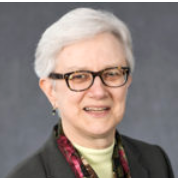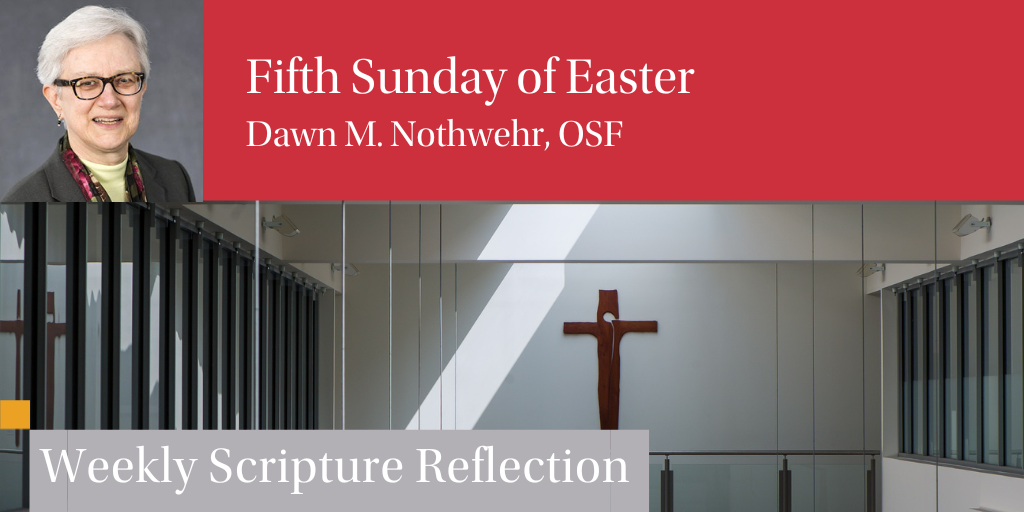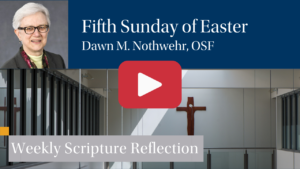
Readings:
Reading I: Acts 6:1-7
Psalm 33:1-2, 4-5, 18-19
Reading II: 1 Pt 2:4-9
Gospel: John 14:1-12
“Do you know the way?” Depending on the circumstances, this question often holds a mixed set of emotions about going somewhere or doing something different. For example: Before leaving the familiar confines of my home – especially when traveling alone or internationally – I study websites, accumulate various maps, and sets of directions, to guarantee that I will not lose my way, and arrive at my destination safely. It is this experience that helps me to understand something of what lies behind the questions Thomas and Philip raise in today’s Gospel.
Prior to the Passover, Jesus is with the disciples. There had been numerous incidents foreshadowing his passion and death. Peter had boldly offered to defend Jesus, unto death – but was rebuked by him (13: 26-38) and then, Judas had left the group (13:26-30). Now – Jesus began instructing the disciples concerning his own departure. He opened with calming words (v 1): “Do not let your hearts be troubled. You have faith in God; have faith also in me.” He then explained that, because He and his Father are in communion with one another, Jesus himself is “the way” (vv.7-11). Jesus also explained how this communion exists between himself and his disciples.
Simply, to contemplate Jesus with the eyes of faith, one also sees the Father, because Jesus and the Father work and share life together in intimate communion (v.7). Thus, Jesus’ words and work are also the Father’s activity of revealing and giving life to the world. To see Jesus’ works is to also see the Father’s power.
During Jesus’ public ministry, anyone who saw him heal or teach would be seeing the activity of a person in intimate communion with God. It was that profound relationship, that Jesus constantly displayed during his public ministry, and with his disciples present. Yet, now it seemed they had failed to comprehend what they had experienced daily!
As Thomas put it: “Master, we do not know where you are going; how can we know the way?” (v. 5) Clearly, Thomas grasped that Jesus is going somewhere, and that he expected the disciples to follow – yet he missed the most crucial part. So, Jesus patiently explains, in explicit terms, and reassures Thomas (vv. 6-7):
“I am the way and the truth and the life. No one comes to the Father except through me. If you know me, then you will also know my Father. From now on you do know him and have seen him.”
But Phillip insists: “Master, show us the Father, and that will be enough for us.” (v.8) A bit exasperated, Jesus again explains (vv.9-11):
9 … “Have I been with you for so long a time, and you still do not know me, Philip? Whoever has seen me has seen the Father. How can you say, ‘Show us the Father’?
10 Do you not believe that I am in the Father and the Father is in me? The words that I speak to you I do not speak on my own. The Father who dwells in me is doing his works.
Jesus then mandates:
11 Believe me that I am in the Father and the Father is in me, or else, believe because of the works themselves.
The second effect of a Christian’s communion with Jesus and his Father is that one acts in union with them. We pray in the spirit and name of Jesus – asking, thinking, and acting ― as Jesus would. A Christian’s prayer becomes participation in Jesus’ own unselfish and confident prayer. Likewise, Christians must also act as Jesus did.
As our First Reading from Acts shows, we must balance our spiritual practices with actions of social, economic, and ecological justice. Building on The Second Vatican Council’s mandate to rediscover earlier models of church, Pope Francis has called us, as Church to Synodality. He asks us to “walk together” and discern ways to bring greater justice, peace, and care for creation into our world. All believers – especially lay men and women – are invited to use their gifts and charisms for service in Christian communities, and the world. Indeed, we are all “the Church!”
As St. Peter put it: But you are “a chosen race, a royal priesthood, a holy nation, a people of his own, so that you may announce the praises” of him who called you out of darkness into his wonderful light. (1 Peter 2:9).
Indeed, Jesus, himself is our Way!
Dawn M. Nothwehr, OSF, PhD
Erica & Harry John Family Professor of Catholic Theological Ethics

